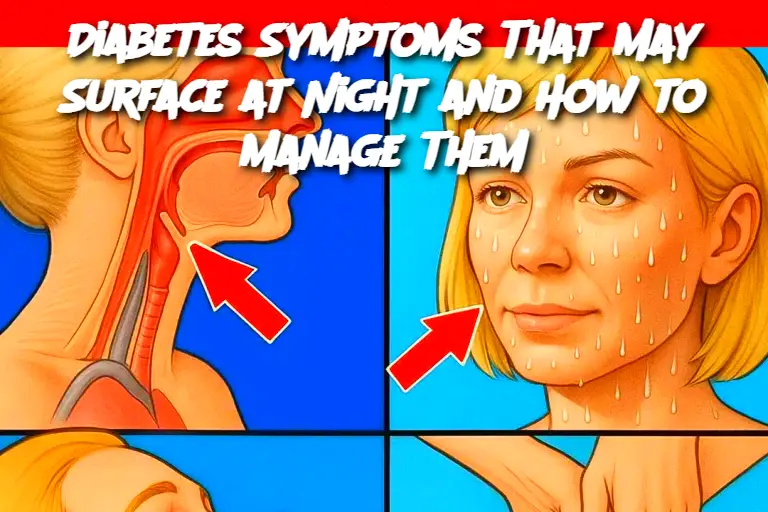ADVERTISEMENT
Introduction: Diabetes, a chronic condition that affects how your body processes blood sugar, can present various symptoms throughout the day, with some emerging more prominently at night. Recognizing these symptoms early is crucial to managing your diabetes and ensuring a good quality of life. At night, your body undergoes different processes than during the day, and this can cause certain diabetes symptoms to become more noticeable. In this article, we’ll explore five common diabetes symptoms that may appear at night and provide useful tips on managing them.
5 Diabetes Symptoms That Appear at Night
Frequent Urination (Nocturia) One of the most common symptoms of diabetes that can occur during the night is frequent urination, known as nocturia. High blood sugar levels can overwhelm the kidneys, causing them to work harder to filter excess glucose. This results in increased urine production, which may cause you to wake up multiple times during the night to visit the bathroom.
Management Tip: If you notice frequent nighttime urination, it’s essential to monitor your blood sugar levels closely. Reducing sugar intake before bed and staying hydrated throughout the day can help. You might also want to consult your healthcare provider about possible adjustments to your diabetes medication.
Increased Thirst (Polydipsia) Elevated blood sugar levels can lead to dehydration, which in turn causes increased thirst, particularly during the night. You may find yourself waking up thirsty and needing to drink more water than usual.
Management Tip: Try drinking water throughout the day to stay properly hydrated. Avoid sugary drinks, as they can further spike your blood sugar. If excessive thirst persists at night, consider discussing your symptoms with your doctor to see if your diabetes management plan needs adjustment.
Nighttime Leg Cramps Diabetic neuropathy, a condition that causes nerve damage due to prolonged high blood sugar, can lead to leg cramps or a sensation of tingling and numbness, especially at night. This can disrupt your sleep and cause discomfort.
Management Tip: Regular physical activity can help improve blood circulation and reduce the occurrence of leg cramps. Stretching before bed, staying well-hydrated, and maintaining stable blood sugar levels can also alleviate these symptoms. If leg cramps continue, talk to your doctor about potential treatments for diabetic neuropathy.
Restless Sleep or Insomnia High or fluctuating blood sugar levels can interfere with the quality of your sleep. People with diabetes often report waking up frequently throughout the night, either from discomfort, thirst, or needing to use the bathroom. These disturbances can result in restless nights and poor sleep quality.
Management Tip: Establishing a regular sleep routine can help, along with managing your blood sugar levels through consistent diet and exercise. Try to avoid heavy meals or excessive caffeine before bedtime, as these can also interfere with your sleep.
Low Blood Sugar (Hypoglycemia) Another common nighttime symptom in people with diabetes is hypoglycemia, or low blood sugar. This can occur if your blood sugar levels drop too much during the night, often due to insulin or medication taken before bed.
Management Tip: If you experience symptoms of hypoglycemia during the night, such as sweating, shaking, or confusion, keep a quick source of sugar, like glucose tablets or juice, by your bedside. Be sure to monitor your blood sugar levels before going to bed, and if necessary, consult your doctor about adjusting your medication or diet to prevent nocturnal hypoglycemia.
Presentation and Storage Tips:
Monitor Symptoms: Keeping a diabetes journal to track your nighttime symptoms can help identify patterns and assist your doctor in adjusting your treatment plan.
Set Reminders: Using an app or alarm to remind you to check your blood sugar levels before bed and during the night can help prevent nighttime issues.
Keep Comfort in Mind: If nighttime leg cramps or other discomforts are affecting your sleep, consider investing in a supportive mattress and pillows designed for improved circulation.
Variants: If you notice that certain foods or habits worsen your nighttime symptoms, such as a heavy meal causing nocturia, it might be helpful to adjust your diet. Eating smaller, balanced meals throughout the day, especially at dinner, can help reduce blood sugar spikes. If you struggle with nighttime thirst, reducing caffeine or alcohol before bed can prevent dehydration.
Frequently Asked Questions:
ADVERTISEMENT
